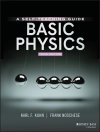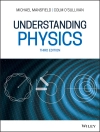In the second, revised edition of a well-established textbook, the author strikes a balance between quantitative rigor and intuitive understanding, using a lively, informal style. The first chapter provides a detailed historical introduction to the subject, while subsequent chapters offer a quantitative presentation of the Standard Model. A simplified introduction to the Feynman rules, based on a ’toy’ model, helps readers learn the calculational techniques without the complications of spin. It is followed by accessible treatments of quantum electrodynamics, the strong and weak interactions, and gauge theories. New chapters address neutrino oscillations and prospects for physics beyond the Standard Model. The book contains a number of worked examples and many end-of-chapter problems. A complete solution manual is available for instructors.
Inhoudsopgave
Preface to the First Edition ix
Preface to the Second Edition xi
Formulas and Constants xiii
Introduction 1
1 Historical Introduction to the Elementary Particles 13
1.1 The Classical ERA (1897–1932) 13
1.2 The Photon (1900–1924) 15
1.3 Mesons (1934–1947) 18
1.4 Antiparticles (1930–1956) 20
1.5 Neutrinos (1930–1962) 23
1.6 Strange Particles (1947–1960) 30
1.7 The Eightfold Way (1961–1964) 35
1.8 The Quark Model (1964) 37
1.9 The November Revolution and Its Aftermath (1974–1983 and 1995) 44
1.10 Intermediate Vector Bosons (1983) 47
1.11 The Standard Model (1978–?) 49
2 Elementary Particle Dynamics 59
2.1 The Four Forces 59
2.2 Quantum Electrodynamics (QED) 60
2.3 Quantum Chromodynamics (QCD) 66
2.4 Weak Interactions 71
2.4.1 Neutral 72
2.4.2 Charged 74
2.4.2.1 Leptons 74
2.4.2.2 Quarks 75
2.4.3 Weak and Electromagnetic Couplings of W and Z 78
2.5 Decays and Conservation Laws 79
2.6 Unification Schemes 84
3 Relativistic Kinematics 89
3.1 Lorentz Transformations 89
3.2 Four-vectors 92
3.3 Energy and Momentum 96
3.4 Collisions 100
3.4.1 Classical Collisions 100
3.4.2 Relativistic Collisions 101
3.5 Examples and Applications 102
4 Symmetries 115
4.1 Symmetries, Groups, and Conservation Laws 115
4.2 Angular Momentum 120
4.2.1 Addition of Angular Momenta 122
4.2.2 Spin 1/2 125
4.3 Flavor Symmetries 129
4.4 Discrete Symmetries 136
4.4.1 Parity 136
4.4.2 Charge Conjugation 142
4.4.3 CP 144
4.4.3.1 Neutral Kaons 145
4.4.3.2 CP Violation 147
4.4.4 Time Reversal and the TCP Theorem 149
5 Bound States 159
5.1 The Schrödinger Equation 159
5.2 Hydrogen 162
5.2.1 Fine Structure 165
5.2.2 The Lamb Shift 166
5.2.3 Hyperfine Splitting 167
5.3 Positronium 169
5.4 Quarkonium 171
5.4.1 Charmonium 174
5.4.2 Bottomonium 175
5.5 Light Quark Mesons 176
5.6 Baryons 180
5.6.1 Baryon Wave Functions 181
5.6.2 Magnetic Moments 189
5.6.3 Masses 191
6 The Feynman Calculus 197
6.1 Decays and Scattering 197
6.1.1 Decay Rates 197
6.1.2 Cross Sections 199
6.2 The Golden Rule 203
6.2.1 Golden Rule for Decays 204
6.2.1.1 Two-particle Decays 206
6.2.2 Golden Rule for Scattering 208
6.2.2.1 Two-body Scattering in the CM Frame 209
6.3 Feynman Rules for a Toy Theory 211
6.3.1 Lifetime of the A 214
6.3.2 A + A → B + B Scattering 215
6.3.3 Higher-order Diagrams 217
7 Quantum Electrodynamics 225
7.1 The Dirac Equation 225
7.2 Solutions to the Dirac Equation 229
7.3 Bilinear Covariants 235
7.4 The Photon 238
7.5 The Feynman Rules for QED 241
7.6 Examples 245
7.7 Casimir’s Trick 249
7.8 Cross Sections and Lifetimes 254
7.9 Renormalization 262
8 Electrodynamics and Chromodynamics of Quarks 275
8.1 Hadron Production in e+e− Collisions 275
8.2 Elastic Electron–Proton Scattering 279
8.3 Feynman Rules For Chromodynamics 283
8.4 Color Factors 289
8.4.1 Quark and Antiquark 289
8.4.2 Quark and Quark 292
8.5 Pair Annihilation in QCD 294
8.6 Asymptotic Freedom 298
9 Weak Interactions 307
9.1 Charged Leptonic Weak Interactions 307
9.2 Decay of the Muon 310
9.3 Decay of the Neutron 315
9.4 Decay of the Pion 321
9.5 Charged Weak Interactions of Quarks 324
9.6 Neutral Weak Interactions 329
9.7 Electroweak Unification 338
9.7.1 Chiral Fermion States 338
9.7.2 Weak Isospin and Hypercharge 342
9.7.3 Electroweak Mixing 345
10 Gauge Theories 353
10.1 Lagrangian Formulation of Classical Particle Mechanics 353
10.2 Lagrangians in Relativistic Field Theory 354
10.3 Local Gauge Invariance 358
10.4 Yang–Mills Theory 361
10.5 Chromodynamics 366
10.6 Feynman Rules 369
10.7 The Mass Term 372
10.8 Spontaneous Symmetry-breaking 375
10.9 The Higgs Mechanism 378
11 Neutrino Oscillations 387
11.1 The Solar Neutrino Problem 387
11.2 Oscillations 390
11.3 Confirmation 392
11.4 Neutrino Masses 395
11.5 The Mixing Matrix 397
12 Afterword: What’s Next? 401
12.1 The Higgs Boson 401
12.2 Grand Unification 405
12.3 Matter/Antimatter Asymmetry 409
12.4 Supersymmetry, Strings, Extra Dimensions 411
12.4.1 Supersymmetry 411
12.4.2 Strings 413
12.5 Dark Matter/Dark Energy 414
12.5.1 Dark Matter 414
12.5.2 Dark Energy 416
12.6 Conclusion 417
A The Dirac Delta Function 423
B Decay Rates and Cross Sections 429
B.1 Decays 429
B.1.1 Two-body Decays 429
B.2 Cross Sections 430
B.2.1 Two-body Scattering 430
C Pauli and Dirac Matrices 433
C.1 Pauli Matrices 433
C.2 Dirac Matrices 434
D Feynman Rules (Tree Level) 437
D.1 External Lines 437
D.2 Propagators 437
D.3 Vertex Factors 438
Index 441
Over de auteur
David Griffiths is Professor of Physics at the Reed College in Portland, Oregon. After obtaining his Ph D in elementary particle theory at Harvard, he taught at several colleges and universities before joining the faculty at Reed in 1978. He specializes in classical electrodynamics and quantum mechanics as well as elementary particles, and has written textbooks on all three subjects.












